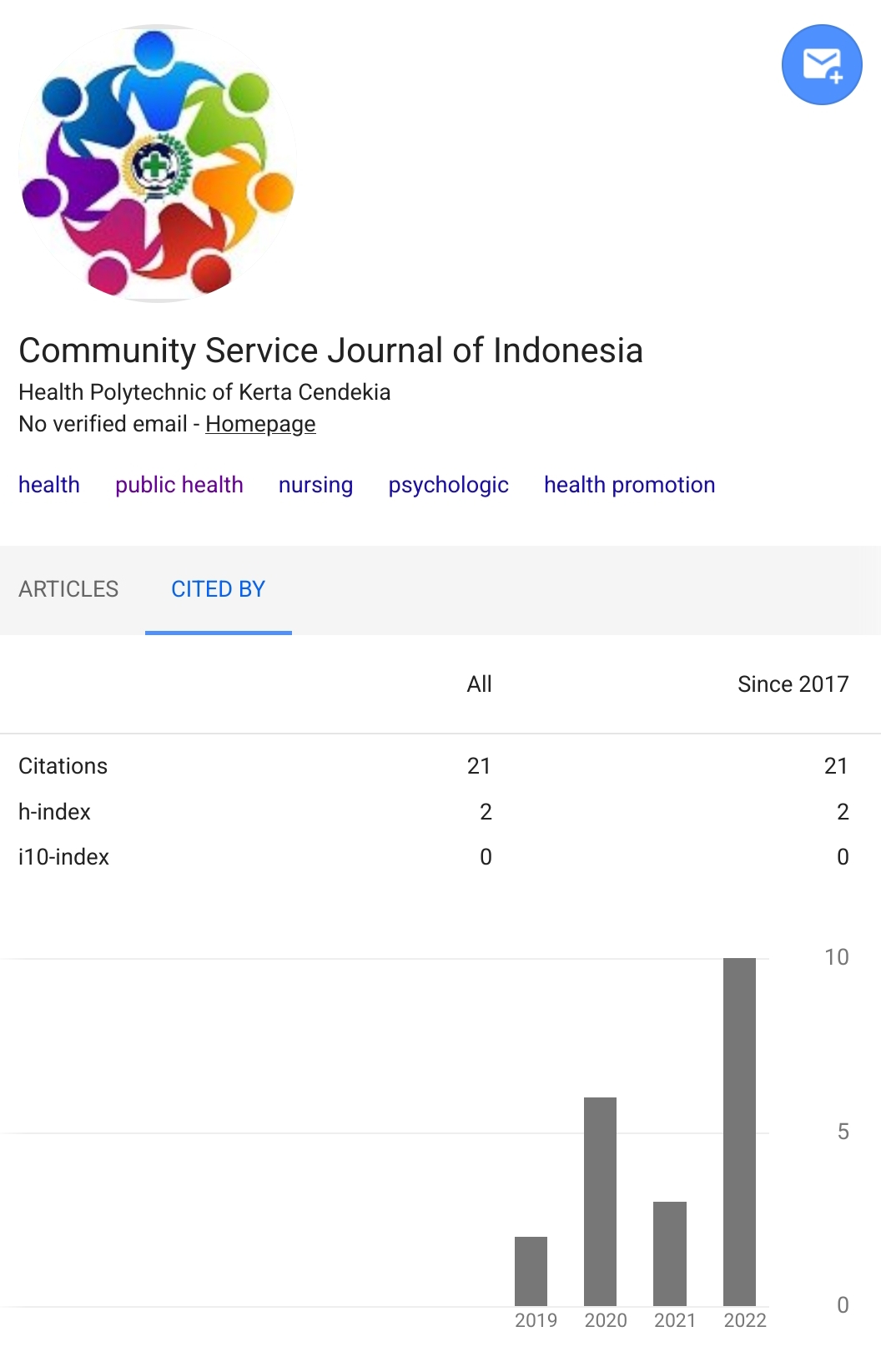DIABETES MELLITUS LIFESTYLE MANAGEMENT AS AN EFFORTS TO IMPROVE QUALITY OF LIFE FOR DIABETES MELLITUS PATIENTS
Keywords:
Diabetes Mellitus, Lifestyle Management, Quality of Life
Abstract
Complications experienced by DM patients will affect the patient's quality of life. Efforts that can be done to maintain the quality of life, one of which is by lifestyle management. This training is expected to increase the knowledge and skills of health cadres in teaching lifestyle management to improve the quality of life of people with diabetes mellitus. The method used in this community service activity is to provide health counseling. This activity was carried out for one month and was attended by 15 cadres and 50 people with DM. Quality of life is measured by DQOL (Diabetes Quality of Life). After one month of service, it was found that 98% of the quality of life of people with DM increased (good). Lifestyle management can maintain the quality of life of people with DM through maintaining stable blood sugar levelsReferences
Association, A. D. (2018). Diabetes Care - Standards of medical care in diabetes 2018. The Journal of Clinical and Applied Research and Education.
Hariawan, H., akhmad, F., & Dewi, P., (2019) Hubungan Gaya Hidup (Pola Makan dan Aktivitas Fisik) Dengan Kejadian Diabetes Melitus di Rumah Sakit Umum PropinsNTB. Jurnal Keperawatan Terpadu https://doi.org/10.32807/jkt.v1i1.16
Kemenkes RI. (2018). Hasil Utama Riset Kesehatan Dasar 2018 Kementrian Kesehatan Badan Penelitian dan Pengembangan Kesehatan. Balitbangkes. https://doi.org/1 Desember 2013
Noorratri, D., & Ari, S,. (2019). Peningkatan Kualitas Hidup Pasien Diabetes melitus Dengan Terapi Fisik. Jurnal Ilmu Keperawatan Komunitas Volume 2 No 1, Hal 19 - 25, Mei 2019 https://doi.org/10.32584/jikk.v2i1.301
Purwandari, Henny. (2017) Hubungan Kepatuhan Diet Dengan Kualitas Hidup Pada Penderita Dm Di Poli Penyakit Dalam Rsud Kertosono. STRADA Jurnal Ilmiah Kesehatan. Vol. 6 No. 2 Desember 2017.
Putri, E. . (2016). Hubungan antara latihan jasmani dengan kadar glukosa darah penderita diabetes. Jurnal Berkala Epidemiologi, 4(2), 188–199. http://doi.org/10.20473/jbe.v4i2.2016.188
Rohmawati, R., Setiawan, A. H. ., Winoto, P. M. P. ., Sari, R. Y., Faizah, I. ., Ilmi, F. . and Tamaro, A. . (2021) “Pengaruh Manajemen Lifestyle terhadap Kadar Gula Darah dan Kualitas Hidup Penderita DM dalam Pandemi Covid-19: THE EFFECT OF LIFESTYLE MANAGEMENT ON BLOOD SUGAR LEVELS AND QUALITY OF LIFE OF DM PATIENTS IN THE COVID-19 PANDEMIC”, Jurnal Ilmu Keperawatan Jiwa, 4(3), pp. 545–552. Available at: https://journal.ppnijateng.org/index.php/jikj/article/view/1026 (Accessed: 18March2022).
Setiyorini, E., & Wulandari, N. A. (2017). Hubungan status nutrisi dengan kualitas hidup pada lansia penderita diabetes mellitus tipe 2 yang berobat di Poli Penyakit Dalam RSD Mardi Waluyo Blitar. Jurnal Ners Dan Kebidanan, 4(2), 125–133. http://doi.org/10.26699/jnk.v4i
Susanti, & Bistara, D. (2018). Hubungan Pola Makan Dengan Kadar Gula Darah Pada Penderita Diabetes Mellitus. Jurnal Kesehatan Vokasional, 3(1), 29–34. https://doi.org/10.22146/jkesvo.34080
Hariawan, H., akhmad, F., & Dewi, P., (2019) Hubungan Gaya Hidup (Pola Makan dan Aktivitas Fisik) Dengan Kejadian Diabetes Melitus di Rumah Sakit Umum PropinsNTB. Jurnal Keperawatan Terpadu https://doi.org/10.32807/jkt.v1i1.16
Kemenkes RI. (2018). Hasil Utama Riset Kesehatan Dasar 2018 Kementrian Kesehatan Badan Penelitian dan Pengembangan Kesehatan. Balitbangkes. https://doi.org/1 Desember 2013
Noorratri, D., & Ari, S,. (2019). Peningkatan Kualitas Hidup Pasien Diabetes melitus Dengan Terapi Fisik. Jurnal Ilmu Keperawatan Komunitas Volume 2 No 1, Hal 19 - 25, Mei 2019 https://doi.org/10.32584/jikk.v2i1.301
Purwandari, Henny. (2017) Hubungan Kepatuhan Diet Dengan Kualitas Hidup Pada Penderita Dm Di Poli Penyakit Dalam Rsud Kertosono. STRADA Jurnal Ilmiah Kesehatan. Vol. 6 No. 2 Desember 2017.
Putri, E. . (2016). Hubungan antara latihan jasmani dengan kadar glukosa darah penderita diabetes. Jurnal Berkala Epidemiologi, 4(2), 188–199. http://doi.org/10.20473/jbe.v4i2.2016.188
Rohmawati, R., Setiawan, A. H. ., Winoto, P. M. P. ., Sari, R. Y., Faizah, I. ., Ilmi, F. . and Tamaro, A. . (2021) “Pengaruh Manajemen Lifestyle terhadap Kadar Gula Darah dan Kualitas Hidup Penderita DM dalam Pandemi Covid-19: THE EFFECT OF LIFESTYLE MANAGEMENT ON BLOOD SUGAR LEVELS AND QUALITY OF LIFE OF DM PATIENTS IN THE COVID-19 PANDEMIC”, Jurnal Ilmu Keperawatan Jiwa, 4(3), pp. 545–552. Available at: https://journal.ppnijateng.org/index.php/jikj/article/view/1026 (Accessed: 18March2022).
Setiyorini, E., & Wulandari, N. A. (2017). Hubungan status nutrisi dengan kualitas hidup pada lansia penderita diabetes mellitus tipe 2 yang berobat di Poli Penyakit Dalam RSD Mardi Waluyo Blitar. Jurnal Ners Dan Kebidanan, 4(2), 125–133. http://doi.org/10.26699/jnk.v4i
Susanti, & Bistara, D. (2018). Hubungan Pola Makan Dengan Kadar Gula Darah Pada Penderita Diabetes Mellitus. Jurnal Kesehatan Vokasional, 3(1), 29–34. https://doi.org/10.22146/jkesvo.34080
Published
2022-10-28
How to Cite
Rohmawati, R., Wijayanti, L., Anggraini, R., Sari, R. Y., Faizah, I., & Irawan, D. (2022). DIABETES MELLITUS LIFESTYLE MANAGEMENT AS AN EFFORTS TO IMPROVE QUALITY OF LIFE FOR DIABETES MELLITUS PATIENTS. Community Service Journal of Indonesia, 4(2), 34-39. https://doi.org/10.36720/csji.v4i2.407
Section
Articles
Copyright (c) 2022 Riska Rohmawati, Lono Wijayanti, Rahayu Anggraini, Ratna Yunita Sari, Imamatul Faizah, Dany Irawan

This work is licensed under a Creative Commons Attribution-NonCommercial 4.0 International License.
Authors who publish with Community Service Journal of Indonesia agree to the following terms:
- Authors retain copyright licensed under a Creative Commons Attribution-NonCommercial 4.0 (CC BY-NC 4.0), which allows others to remix, tweak, and build upon the authors' work non-commercially, and although the others' new works must also acknowledge the authors and be non-commercial, they don't have to license their derivative works on the same terms.
- Authors are permitted and encouraged to post their work online (e.g., in institutional repositories or on their website) prior to and during the submission process, as it can lead to productive exchanges, as well as earlier and greater citation of published work (See The Effect of Open Access). Authors can archive pre-print and post-print or publisher's version/PDF.













